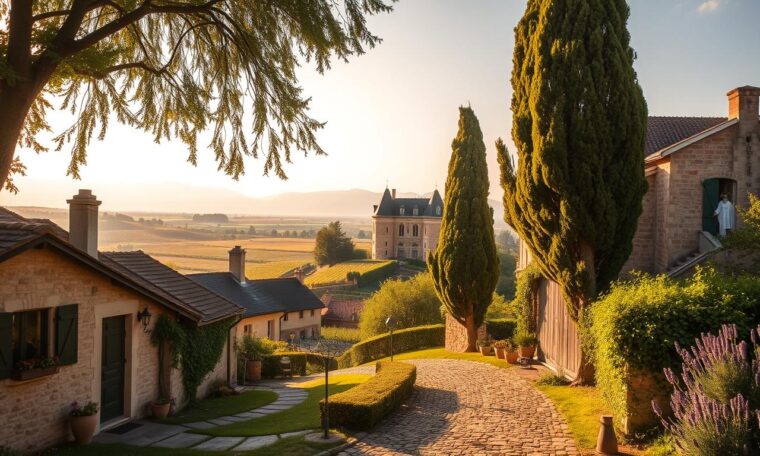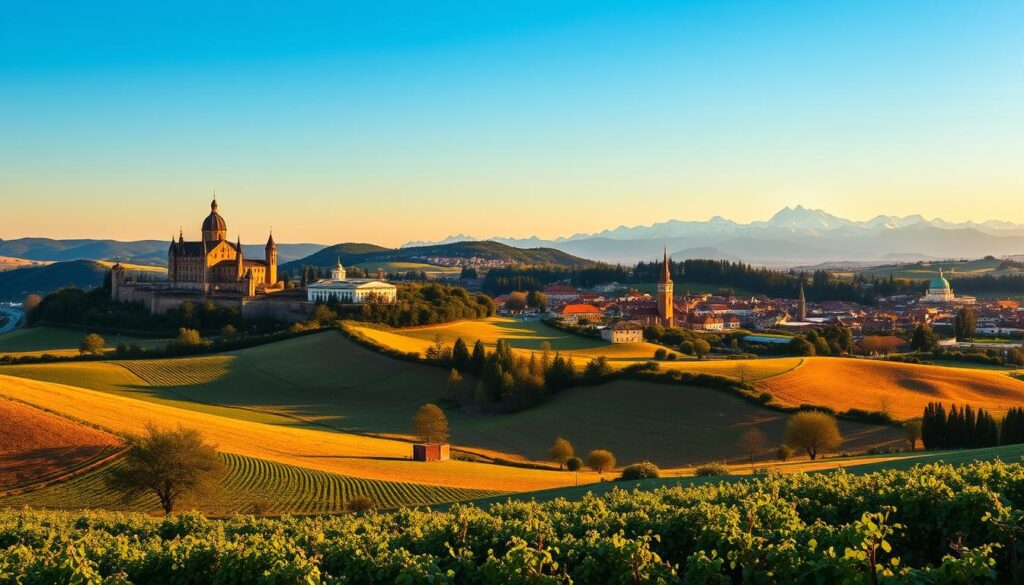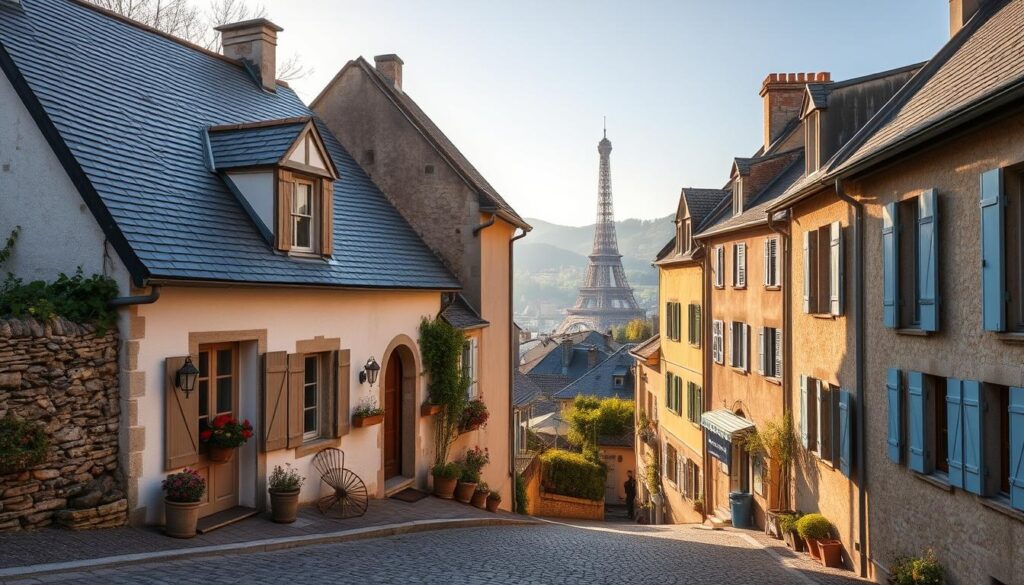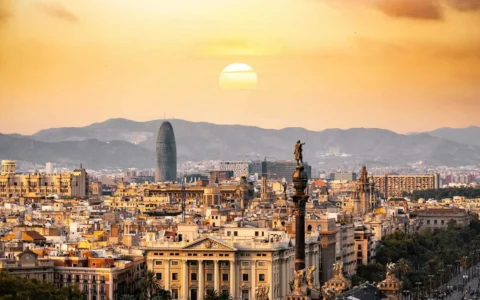
Embark on a journey to France, a country renowned for its rich history, art, fashion, and exquisite cuisine. Planning your dream vacation involves more than just picking a destination; it’s about creating an unforgettable experience.
From the iconic Eiffel Tower to the picturesque villages of Provence, France has something for every traveler. Whether you’re drawn to the charming streets of Paris or the serene landscapes of the countryside, your travel planning should start with the essentials.
Key Takeaways
- Best times to visit France for an optimal travel experience
- Must-see destinations that make France unforgettable
- Practical tips for turning your French dream into a reality
- Insights into French culture and history
- Travel planning strategies for a stress-free vacation
The Allure of France: Why It Should Be Your Next Destination
The allure of France lies in its diverse landscapes, cultural richness, and centuries-old history. This captivating country offers a unique blend of experiences that cater to all kinds of travelers.
A Land of Diverse Experiences
France is renowned for its artistic treasures, historical monuments, and cultural events. Visitors can explore the artistic masterpieces at the Louvre or enjoy the scenic beauty of the French Riviera. The country’s diverse regions, from the vineyards of Bordeaux to the lavender fields of Provence, offer a myriad of experiences.
Cultural Richness and Historical Significance
France’s cultural richness is evident in its world-famous museums and historical monuments. The Palace of Versailles, with its opulent decor and intricate gardens, is a testament to France’s royal past.
World-Famous Museums and Monuments
France is home to some of the world’s most iconic museums, including the Louvre and Orsay, which house an impressive collection of art from various periods. The Eiffel Tower, Notre-Dame Cathedral, and Arc de Triomphe are just a few of the historical monuments that dot the French landscape.
Centuries of Influential History
France’s history is a rich tapestry of events and eras, from the Renaissance to the French Revolution. Visitors can walk through the streets of Paris and discover historical sites that tell the story of France’s past.
| Region | Cultural Experience | Historical Landmark |
|---|---|---|
| Paris | Louvre Museum | Eiffel Tower |
| Versailles | Palace of Versailles | Hall of Mirrors |
| Provence | Lavender Fields | Roman Ruins |
“France is a place where you can still feel the history and culture in every corner.” –
Best Times to Visit France Throughout the Year
From the blooming lavender fields of spring to the festive Christmas markets of winter, France’s charm changes with the seasons. Understanding the best times to visit can help you plan a trip that suits your preferences and budget.
Seasonal Highlights and Weather Patterns
France experiences a diverse range of climates, from the Mediterranean warmth in the south to the cooler oceanic climate in the northwest. Spring (March to May) is characterized by mild temperatures and blooming flora, making it ideal for outdoor activities like hiking and cycling. Summer (June to August) brings warmth and long days, perfect for enjoying France’s beautiful beaches and summer celebrations. Autumn (September to November) is a great time for wine enthusiasts, with harvest festivals in regions like Bordeaux and Burgundy. Winters (December to February) are cozy, with Christmas markets and ski resorts in the Alps.
Peak vs. Off-Peak Travel Considerations
Peak travel season in France is during the summer months and around major holidays. While this is the best time to enjoy certain events and warm weather, it also means larger crowds and higher prices. Traveling during the off-peak season can offer significant savings and a more relaxed experience, but some attractions and tourist facilities might be closed or operate on reduced hours.
Festival Calendar and Special Events
France’s festival calendar is rich and varied, offering something for every interest.
Summer Celebrations
Bastille Day on July 14th is one of France’s most significant national holidays, celebrated with military parades, fireworks, and street parties across the country.
Winter Holidays and Markets
The winter season is marked by festive Christmas markets, especially in cities like Strasbourg, Colmar, and Paris, offering a magical atmosphere with mulled wine, crafts, and local delicacies.
| Season | Weather | Highlights |
|---|---|---|
| Spring | Mild temperatures | Blooming lavender, outdoor activities |
| Summer | Warm and sunny | Beach activities, Bastille Day celebrations |
| Autumn | Cooling temperatures | Wine harvest festivals |
| Winter | Cold, possible snow | Christmas markets, skiing in the Alps |
Must-See Destinations Across France
With its rich history, cultural landmarks, and breathtaking landscapes, France offers a myriad of unforgettable experiences for travelers. The country’s diverse regions are replete with must-see destinations that cater to a wide range of interests.
Paris: The City of Light
Paris, the capital city of France, is renowned for its iconic landmarks and cultural significance. Visitors from around the world flock to Paris to experience its unique blend of history, art, and fashion.
Iconic Landmarks
Paris is home to some of the world’s most famous landmarks, including the Eiffel Tower and Notre-Dame Cathedral. The Eiffel Tower, built for the 1889 World’s Fair, is an engineering marvel and a symbol of Paris. Notre-Dame Cathedral, with its Gothic architecture and stunning stained glass windows, is a masterpiece of medieval craftsmanship.
Beyond its iconic landmarks, Paris has a number of lesser-known neighborhoods worth exploring. Le Marais, with its trendy boutiques and art galleries, is a favorite among locals and visitors alike. The historic neighborhood of Montmartre, known for its bohemian vibe and street artists, offers a glimpse into Paris’s artistic past.
The French Riviera’s Coastal Charm
The French Riviera, or Côte d’Azur, is famous for its luxurious resorts, yachting culture, and picturesque beaches. Visitors can enjoy the glamour of Nice, the charm of Cannes, and the beauty of Monaco, all within a short distance of each other.
Countryside Treasures and Hidden Gems
France’s countryside is dotted with medieval villages, vineyards, and châteaux, offering a wealth of opportunities for exploration. The medieval village of Eze, perched on a hilltop, is a must-visit for its breathtaking views and historic architecture. The vineyards of Bordeaux are renowned for producing some of the world’s finest wines.
| Region | Must-See Destinations | Highlights |
|---|---|---|
| Paris | Eiffel Tower, Notre-Dame Cathedral | Iconic landmarks, cultural significance |
| French Riviera | Nice, Cannes, Monaco | Luxurious resorts, yachting culture, beautiful beaches |
| Countryside | Eze, Bordeaux | Medieval villages, vineyards, châteaux |
Regional Exploration: Discovering France’s Diverse Landscapes
Exploring France’s regions is like uncovering a treasure trove of cultural and natural wonders. The country’s diverse landscapes offer a unique blend of history, culture, and natural beauty that caters to all kinds of travelers.
Normandy and Brittany: Coastal Wonders
The Normandy and Brittany regions are known for their dramatic coastlines and historic sites. Visitors can explore the D-Day beaches, Mont Saint-Michel, and enjoy the local seafood. The picturesque villages and rugged coastline make these regions a must-visit.

Provence and the Lavender Fields
Provence is famous for its lavender fields, charming villages, and vibrant culture. The region’s picturesque landscapes and pleasant climate make it a popular destination. Visitors can enjoy the local cuisine, visit historic sites, and experience the beauty of the lavender fields during the summer months.
The Alpine Majesty of the French Alps
The French Alps offer a haven for skiers and hikers, with world-class resorts like Chamonix and Courchevel. The region’s majestic mountains, picturesque villages, and vibrant après-ski scene make it a top destination for outdoor enthusiasts.
Loire Valley: Land of Châteaux
The Loire Valley is renowned for its stunning châteaux, such as Chambord and Chenonceau. The region’s picturesque landscapes, historic castles, and charming villages make it a perfect destination for those interested in history, architecture, and natural beauty.
Transportation Guide: Navigating Your Way Through France
France boasts an extensive and efficient transportation network, making it easy for travelers to explore its diverse regions. Whether you’re heading to the City of Light or the French Riviera, France’s transportation options ensure a smooth journey.
Train Travel: The TGV and Regional Networks
The TGV (Train à Grande Vitesse) is one of France’s most iconic transportation modes, offering high-speed travel between major cities like Paris, Lyon, and Marseille. Regional trains connect smaller towns and rural areas, providing a convenient way to explore the countryside.
Rental Cars and Road Trip Planning
For more flexibility, rental cars are an excellent option, allowing travelers to explore France at their own pace. With well-maintained roads and scenic routes, a road trip through France can be a memorable experience.
Public Transportation in Major Cities
Major cities in France have efficient public transportation systems, including metro lines, buses, and tramways. Paris, for example, has an extensive metro network that covers most areas of the city.
Flights Between French Destinations
For longer distances or to reach more remote areas, domestic flights are available. While not as frequent as train services, flights can be a convenient option for travelers with limited time.
| Transportation Mode | Advantages | Typical Routes |
|---|---|---|
| TGV | High-speed, convenient | Paris to Lyon, Marseille, Bordeaux |
| Rental Cars | Flexibility, scenic routes | Countryside, rural areas |
| Public Transportation | Efficient, affordable | Major cities like Paris, Lyon |
| Domestic Flights | Quick, long-distance | Paris to Nice, Bordeaux, etc. |
Where to Stay: Accommodation Options for Every Budget
From luxury châteaux to budget-friendly hostels, France offers a wide range of places to stay. Whether you’re looking to indulge in the finer things in life or keep costs low, there’s something for everyone.
Luxury Hotels and Historic Châteaux
For those seeking a luxurious experience, France is home to numerous high-end hotels and historic châteaux. These establishments offer opulent accommodations, fine dining, and exceptional service. Staying in a château can be a particularly memorable experience, with many offering stunning gardens and picturesque settings.
Boutique Hotels and Bed & Breakfasts
Boutique hotels and bed & breakfasts provide a more personalized experience, often with unique decor and a cozy atmosphere. These establishments are ideal for travelers looking for a more intimate connection with the local culture and community.

Budget-Friendly Options and Hostels
Travelers on a budget will find plenty of affordable accommodation options in France, including hostels and budget hotels. These are particularly prevalent in larger cities like Paris and Lyon, where you’ll find a range of choices to suit your budget.
Vacation Rentals and Apartment Stays
For families or longer stays, vacation rentals and apartment stays are an excellent choice. They offer the comforts of home, including kitchen facilities, and the opportunity to live like a local. Many are available in city centers, making it easy to explore France’s vibrant towns and cities.
| Accommodation Type | Average Cost | Features |
|---|---|---|
| Luxury Hotels | $250-$500 per night | High-end amenities, fine dining, exceptional service |
| Boutique Hotels/B&Bs | $100-$250 per night | Personalized service, unique decor, local charm |
| Budget-Friendly Options | $30-$100 per night | Basic amenities, affordable rates, social atmosphere |
| Vacation Rentals | $500-$1,500 per week | Home comforts, kitchen facilities, local living experience |
Culinary Journey Through France’s Gastronomic Landscape
France, renowned for its sophisticated cuisine, invites you to explore its diverse gastronomic landscape. The country’s culinary identity is shaped by its rich history, cultural heritage, and geographical diversity.
Regional Specialties Worth Trying
Each region in France boasts its unique culinary specialties. Northern France is famous for its seafood dishes and hearty recipes like Coq au Vin.
Northern French Cuisine
Northern French cuisine is characterized by its use of fresh seafood, such as mussels and sole, often paired with locally produced cheeses and beers.
Mediterranean Influences in the South
The southern regions of France are influenced by Mediterranean flavors, with a focus on olive oil, garlic, and herbs, as seen in dishes like Ratatouille and Soupe de Poisson.
Wine Regions and Tasting Experiences
France is home to some of the world’s most prestigious wine regions, including Bordeaux, Burgundy, and Champagne. Visitors can enjoy wine tastings and tours, gaining insights into the wine production process.
| Wine Region | Notable Wines | Tasting Experience |
|---|---|---|
| Bordeaux | Red blends | Château Lafite Rothschild |
| Burgundy | Pinot Noir, Chardonnay | Domaine de la Romanée-Conti |
| Champagne | Sparkling wines | Moët & Chandon |
Dining Etiquette and Reservation Tips
Understanding dining etiquette can enhance your culinary experience in France. It’s customary to make reservations in advance, especially in popular restaurants.
Markets and Food Shopping
Exploring local markets and food shops is a great way to immerse yourself in French culinary culture. Markets like Marché aux Puces de Saint-Ouen in Paris offer a wide range of gourmet products.
Cultural Insights: Customs and Etiquette for American Travelers
To truly enjoy your trip to France, it’s essential to grasp the nuances of French customs and etiquette. Understanding these cultural insights can make a significant difference in how you experience this beautiful country.
Language Basics: Essential French Phrases
Learning a few basic French phrases like “bonjour” (hello) and “merci” (thank you) can go a long way in showing respect for the culture. It’s also helpful to know phrases like “excusez-moi” (excuse me) and “pouvez-vous m’aider?” (can you help me?).
Social Customs and Polite Behavior
French social customs emphasize politeness and formality. When greeting shopkeepers, say “bonjour” before making your request. Using polite language, such as “s’il vous plaît” (please), is also appreciated.
Shopping and Tipping Practices
Tipping in France is generally less than in the United States. For service charges, a tip of 5-10% is considered sufficient. When shopping, be aware that haggling is not common in most stores, but it may be acceptable in markets.
Understanding Business Hours and Holidays
Business hours in France typically range from 9:00 AM to 7:00 PM, with a break for lunch. Many businesses close on Sundays and public holidays. Being aware of these hours can help plan your day.
| Day | Typical Business Hours |
|---|---|
| Monday to Saturday | 9:00 AM – 12:00 PM, 2:00 PM – 7:00 PM |
| Sunday | Closed |
By understanding and respecting these cultural norms, you can have a more enjoyable and enriching experience in France.
Practical Planning: Budgeting for Your France Vacation
Budgeting for a France vacation involves understanding various costs that can vary significantly by region. To make the most of your trip, it’s essential to plan your expenses carefully.
Cost Expectations by Region
France is a diverse country with different regions having different cost implications. For instance, Paris, being the capital, tends to be more expensive than other regions. Accommodation, food, and activities can cost significantly more in Paris compared to smaller towns or rural areas.
| Region | Average Daily Cost per Person |
|---|---|
| Paris | $150-$200 |
| Provence | $100-$150 |
| French Riviera | $120-$180 |
Money-Saving Tips and Strategies
To save money, consider visiting during the off-season, opting for budget-friendly accommodations, and using public transportation. Booking accommodations and tourist attractions in advance can also help reduce costs.
Visa Requirements and Travel Documentation
For American travelers, checking visa requirements is crucial. While a visa is not required for short stays, ensuring your passport is valid for at least six months beyond your planned departure date is necessary.
Health Insurance and Safety Considerations
Having health insurance that covers you abroad is vital. Additionally, being aware of safety considerations, such as pickpocketing in tourist areas, can help ensure a smooth trip.
By understanding these aspects, you can better plan your France vacation, ensuring a memorable and stress-free experience.
Conclusion: Making Your French Dream a Reality
Turning your France travel aspirations into a reality requires some planning, but the journey is just as exciting as the destination. With a better understanding of the best times to visit, must-see destinations, and practical travel planning tips, you’re well on your way to creating an unforgettable dream vacation.
From the historic landmarks of Paris to the breathtaking landscapes of the French Alps, France has something to offer every kind of traveler. By being mindful of cultural insights, transportation options, and accommodation choices, you can tailor your trip to suit your preferences and budget.
As you embark on your French adventure, remember to soak up the local culture, indulge in the country’s renowned cuisine, and explore the hidden gems that make France so unique. With careful planning and an open mind, your France travel experience is sure to be nothing short of extraordinary.

